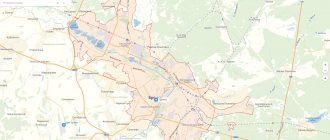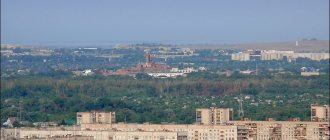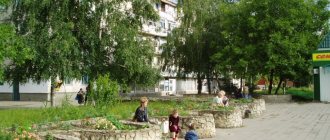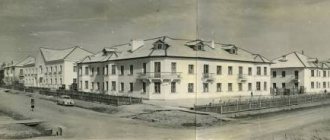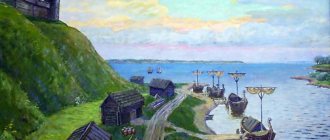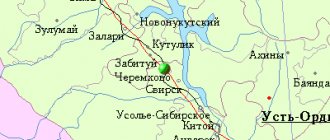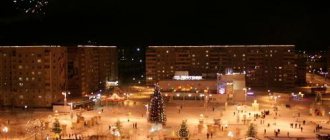Novovoronezh
Novovoronezh was founded as a village in connection with the start of construction of the Novovoronezh Nuclear Power Plant. The year of foundation is 1957, this year the first peg was driven in on the site of the future village, the first barracks and residential buildings were laid. The new settlement immediately received the status of an urban-type settlement. Already in 1958, work began on the construction of the Novovoronezh nuclear power plant. The first houses, a bathhouse, and a grocery store were put into operation. In the same year, construction of the railway began. In Novovoronezh, the first central library was opened, a village hospital with 75 beds, at which a clinic was opened for 100 visits per shift. The hospital is located in 3 barracks-type rooms. In 1959, construction of a highway began, which was supposed to connect the village with the city of Voronezh, and after 2 years regular bus service along the highway was opened.
In October 1958, the evening branch of the Voronezh Assembly College began operating. In 1966, the technical school opened a full-time department. In 1969, the first graduation of full-time students took place, who entered the secondary school. The teachers of the technical school were engineers from the construction department and nuclear power plants, who worked part-time.
In 1959, the Levorossoshansky district was renamed Novovoronezhsky, the village of Novovoronezh became its administrative center, which was moved from the village of Levaya Rossosh. The village remained in this status until 1963, until the abolition of the Novovoronezh district.
Until 1959, the construction of the village and the nuclear power plant was classified. In August 1959, information about the Novovoronezh nuclear power plant ceased to be secret, the nuclear power plant acquired national significance and world fame. In the same year, the Palace of Culture and the first kindergarten for 100 children opened in the village, and in July 1959 a bakery began operating. The opening of the first comprehensive school No. 1 with a capacity of 920 students took place. In 1959–1963, a cinema, a canteen, a hospital, and other public institutions were built, another school, as well as a nursery, opened its doors.
In 1960, the Central Committee of the Komsomol declared the Novovoronezh Nuclear Power Plant an All-Union Komsomol shock construction site. The residential village quickly developed and expanded. In the original version, it was planned to build residential buildings for a population of up to 5,000 people, mainly for station staff. But the number of blocks was increased, and this led to a change in the scale of the village. A city postal center was built. In 1961, a hospital building with 110 beds and an ambulance station were opened. In the same year, a new secondary school with a capacity of 520 students and a boarding school opened specifically for the children of nuclear power plant workers, which accepted children from low-income families, were put into operation. In 1962, a new kindergarten was opened (today it is kindergarten No. 5). The Don Hotel is open for visitors, with rooms for 100 people.
In 1963, the first power unit of a 210 kW nuclear power plant was physically launched. In 1963–1968, the House of Culture named after. Lenin Komsomol, secondary school No. 3, pioneer camp, kindergartens, the poultry shop of the meat processing plant began producing products.
By decree of the Presidium of the Supreme Soviet of the RSFSR dated March 23, 1987, Novovoronezh was transformed into a city of regional subordination.
In 2008, construction of the Novovoronezh NPP-2 with a design capacity of 2400 MW began near Novovoronezh. The new station will eventually replace the existing Novovoronezh NPP.
Recommendations
Cathedral of Christ the Savior in Novovoronezh
Notes
- ^ a b c d e
Law No. 87-OZ - ^ a b
Federal State Statistics Service of Russia (2011).
“All-Russian Population Census 2010. Volume 1" [All-Russian Population Census 2010, vol. 1]. All-Russian Population Census 2010 [All-Russian Population Census 2010]
(in Russian). Federal State Statistics Service. - "26. The size of the permanent population of the Russian Federation by municipalities as of January 1, 2022.” Federal State Statistics Service. Retrieved January 23, 2022.
- ^ a b c
Law No. 88-OZ - "On the calculation of time." Official Internet portal of legal information
(in Russian). June 3, 2011. Retrieved January 19, 2022. - Post office. Information and computing center of OASU RPO. ( Post office
).
Search for postal facilities ( Search for postal facilities
) (in Russian) - Federal State Statistics Service of Russia (May 21, 2004). “The population of Russia, the constituent entities of the Russian Federation as part of federal districts, urban settlements, urban settlements, settlements, settlements of 3 thousand or more people.” [Population of Russia, its federal districts, federal subjects, districts, urban settlements, rural settlements - administrative centers, rural settlements with a population of more than 3000 people] (XLS). All-Russian Population Census of 2002 [All-Russian Population Census of 2002]
(in Russian). - “All-Union Population Census of 1989. The actual population of the union and autonomous republics, autonomous regions and districts, territories, regions, urban settlements and villages in the city.” www.novovoronezh.ru
. Retrieved 2018-07-06. - Novovoronezh and Hungarian Paks became sister cities
Authorities
City leaders
Chairmen of city executive committees:
- Shatalov, Alexander Nikolaevich
- Safronov, Viktor Alekseevich
- Gorbatovsky, Andrey Ivanovich
Heads of Administration:
- Verba, Ivan Grigorievich
- Chesnochenko, Konstantin Konstantinovich
- Sinitsyn, Vladimir Nikolaevich (12/8/1996 elected by popular vote for the first term - 12/8/2000 term of office expired; 12/24/2000 elected by popular vote for the second term - 12/29/2004 term of office expired; remained in office until mid-2005 due to absence successor)
- Akimov, Sergey Leonidovich (06/30/2005 appointed by decision of the Novovoronezh City Duma - resigned 03/11/2010)
- Mozgovoy, Sergey Ivanovich (appointed by decision of the Novovoronezh City Duma on June 1, 2010 - resigned on September 12, 2011)
- Chestikin, Sergey Aleksandrovich (11/2/2011 appointed by decision of the Novovoronezh City Duma for the first term - 09/29/2015 appointed by decision of the Novovoronezh City Duma as acting head of the administration due to the expiration of the term of office; 12/2/2015 appointed by decision of the Novovoronezh City Duma for the second term - present time)
Links
Shut down nuclear power plants Aktau (former Shevchenko) • Visaginas (former Snechkus) • Obninsk • Pripyat (abandoned in 1986) • Seversk (former Tomsk-7) • Slavutich Unfinished nuclear power plants Agidel • Orbit • Kamskie Polyany • Teplodar • Chistye Bory • Shchelkino This is a draft article on the geography of the Voronezh region. You can help the project by adding to it.
An excerpt characterizing Novovoronezh
Rostov, without listening to him, pushed his horse, galloped ahead of the squadron, and before he had time to command the movement, the entire squadron, experiencing the same thing as him, set off after him. Rostov himself did not know how and why he did it. He did all this, as he did on the hunt, without thinking, without thinking. He saw that the dragoons were close, that they were galloping, upset; he knew that they could not stand it, he knew that there was only one minute that would not return if he missed it. The bullets squealed and whistled around him so excitedly, the horse begged forward so eagerly that he could not stand it. He touched his horse, gave the command, and at the same moment, hearing behind him the sound of the stomping of his deployed squadron, at full trot, he began to descend towards the dragoons down the mountain. As soon as they went downhill, their trot gait involuntarily turned into a gallop, which became faster and faster as they approached their lancers and the French dragoons galloping behind them. The dragoons were close. The front ones, seeing the hussars, began to turn back, the rear ones stopped. With the feeling with which he rushed across the wolf, Rostov, releasing his bottom at full speed, galloped across the frustrated ranks of the French dragoons. One lancer stopped, one foot fell to the ground so as not to be crushed, one riderless horse got mixed up with the hussars. Almost all the French dragoons galloped back. Rostov, having chosen one of them on a gray horse, set off after him. On the way he ran into a bush; a good horse carried him over, and, barely able to cope in the saddle, Nikolai saw that in a few moments he would catch up with the enemy whom he had chosen as his target. This Frenchman was probably an officer - judging by his uniform, he was bent over and galloping on his gray horse, urging it on with a saber. A moment later, Rostov’s horse hit the rear of the officer’s horse with its chest, almost knocking it down, and at the same moment Rostov, without knowing why, raised his saber and hit the Frenchman with it. The instant he did this, all the animation in Rostov suddenly disappeared. The officer fell not so much from the blow of the saber, which only slightly cut his arm above the elbow, but from the push of the horse and from fear. Rostov, holding back his horse, looked for his enemy with his eyes to see whom he had defeated. The French dragoon officer was jumping on the ground with one foot, the other was caught in the stirrup. He, squinting in fear, as if expecting a new blow every second, wrinkled his face and looked up at Rostov with an expression of horror. His face, pale and splattered with dirt, blond, young, with a hole in the chin and light blue eyes, was not the face of a battlefield, not an enemy’s face, but a very simple indoor face. Even before Rostov decided what he would do with him, the officer shouted: “Je me rends!” [I give up!] In a hurry, he wanted and could not untangle his leg from the stirrup and, without taking his frightened blue eyes off, looked at Rostov. The hussars jumped up and freed his leg and put him on the saddle. Hussars from different sides fiddled with the dragoons: one was wounded, but, with his face covered in blood, did not give up his horse; the other, hugging the hussar, sat on the croup of his horse; the third, supported by a hussar, climbed onto his horse. The French infantry ran ahead, shooting. The hussars hastily galloped back with their prisoners. Rostov galloped back with the others, experiencing some kind of unpleasant feeling that squeezed his heart. Something unclear, confusing, which he could not explain to himself, was revealed to him by the capture of this officer and the blow he dealt him. Count Osterman Tolstoy met the returning hussars, called Rostov, thanked him and said that he would report to the sovereign about his brave deed and would ask for the St. George Cross for him. When Rostov was demanded to appear before Count Osterman, he, remembering that his attack had been launched without orders, was fully convinced that the boss was demanding him in order to punish him for his unauthorized act. Therefore, Osterman’s flattering words and the promise of a reward should have struck Rostov all the more joyfully; but the same unpleasant, unclear feeling sickened him morally. “What the hell is tormenting me? – he asked himself, driving away from the general. - Ilyin? No, he's intact. Have I embarrassed myself in any way? No. Everything is wrong! “Something else tormented him, like remorse.” - Yes, yes, this French officer with a hole. And I remember well how my hand stopped when I raised it.” Rostov saw the prisoners being taken away and galloped after them to see his Frenchman with a hole in his chin. He, in his strange uniform, sat on a winding hussar horse and restlessly looked around him. The wound on his hand was almost not a wound. He feigned a smile at Rostov and waved his hand as a greeting. Rostov still felt awkward and ashamed of something. All this day and the next, Rostov's friends and comrades noticed that he was not boring, not angry, but silent, thoughtful and concentrated. He drank reluctantly, tried to remain alone and kept thinking about something. Rostov kept thinking about this brilliant feat of his, which, to his surprise, bought him the St. George Cross and even made him a reputation as a brave man - and he just couldn’t understand something. “So they are even more afraid of us! - he thought. – So that’s all there is to it, what’s called heroism? And did I do this for the fatherland? And what is he to blame with his hole and blue eyes? And how scared he was! He thought that I would kill him. Why should I kill him? My hand trembled. And they gave me the St. George Cross. Nothing, I don’t understand anything!” But while Nikolai was processing these questions within himself and still did not give himself a clear account of what had so confused him, the wheel of happiness in his career, as often happens, turned in his favor. He was pushed forward after the Ostrovnensky affair, they gave him a battalion of hussars and, when it was necessary to use a brave officer, they gave him instructions. Having received the news of Natasha’s illness, the Countess, still not entirely healthy and weak, came to Moscow with Petya and the whole house, and the entire Rostov family moved from Marya Dmitrievna to their own house and completely settled in Moscow. Natasha’s illness was so serious that, to her happiness and to the happiness of her family, the thought of everything that was the cause of her illness, her action and the break with her fiancé became secondary. She was so sick that it was impossible to think about how much she was to blame for everything that happened, while she did not eat, did not sleep, was noticeably losing weight, was coughing and was, as the doctors made her feel, in danger. All I had to think about was helping her. The doctors visited Natasha both separately and in consultations, spoke a lot of French, German and Latin, condemned each other, prescribed a wide variety of medicines for all the diseases known to them; but not one of them had the simple thought that they could not know the disease that Natasha suffered, just as no disease that plagues a living person could be known: for every living person has his own characteristics and always has a special and its own new, complex, unknown to medicine disease, not a disease of the lungs, liver, skin, heart, nerves, etc., recorded in medicine, but a disease consisting of one of the countless compounds in the suffering of these organs. This simple thought could not occur to doctors (just as the thought that he cannot cast magic cannot occur to a sorcerer) because their life’s work was to heal, because they received money for this, and because They spent the best years of their lives on this matter. But the main thing is that this thought could not occur to the doctors because they saw that they were undoubtedly useful, and were truly useful for all the Rostovs at home. They were useful not because they forced the patient to swallow mostly harmful substances (this harm was little sensitive, because harmful substances were given in small quantities), but they were useful, necessary, inevitable (the reason is why there are and will always be imaginary healers, fortune tellers, homeopaths and allopaths) because they satisfied the moral needs of the patient and the people who love the patient. They satisfied that eternal human need of hope for relief, the need for sympathy and activity that a person experiences during suffering. They satisfied that eternal, human - noticeable in a child in the most primitive form - need to rub the place that is bruised. The child is killed and immediately runs into the arms of the mother, the nanny, so that they can kiss and rub the sore spot, and it becomes easier for him when the sore spot is rubbed or kissed. The child does not believe that his strongest and wisest do not have the means to help his pain. And the hope of relief and expressions of sympathy while his mother rubs his lump comfort him. The doctors were useful to Natasha because they kissed and rubbed the bobo, assuring that it would pass now if the coachman went to the Arbat pharmacy and took seven hryvnia worth of powders and pills in a nice box for a ruble, and if these powders would certainly be in two hours, no more and no less, the patient will take it in boiled water.
Geography
The city is located on the left bank of the Don, 38 km south of Voronezh[2]. The development area is 46.13 km². Novovoronezhskaya railway station (Kolodeznaya-Novovoronezhskaya branch of the South Eastern Railway), at the moment there is no passenger service.
Climate
The city's climate is temperate continental, with four distinct seasons. Weather conditions in Novovoronezh are influenced by prevailing winds, terrain and urban development. The NV NPP’s non-freezing winter cooling pond also has an indirect effect on the city’s climate.
| Climate of Novovoronezh | |||||||||||||
| Index | Jan. | Feb. | March | Apr. | May | June | July | Aug. | Sep. | Oct. | Nov. | Dec. | Year |
| Average maximum, °C | −5 | −4,2 | 1,2 | 13,2 | 21,1 | 24,8 | 26,1 | 25,2 | 19,0 | 10,6 | 2,4 | −1,9 | 11,0 |
| Average temperature, °C | −8,3 | −7,8 | −2,3 | 8,3 | 15,2 | 19,0 | 20,4 | 19,4 | 13,7 | 6,7 | −0,3 | −4,7 | 6,6 |
| Average minimum, °C | −11,6 | −11,4 | −5,7 | 3,4 | 9,4 | 13,2 | 14,8 | 13,6 | 8,5 | 2,8 | −2,9 | −7,5 | 2,2 |
| Precipitation rate | 40 | 31 | 29 | 37 | 44 | 65 | 69 | 52 | 51 | 41 | 47 | 48 | 554 |
| Source: [ru.climate-data.org/location/46196/ Climatic data for Novovoronezh] | |||||||||||||
